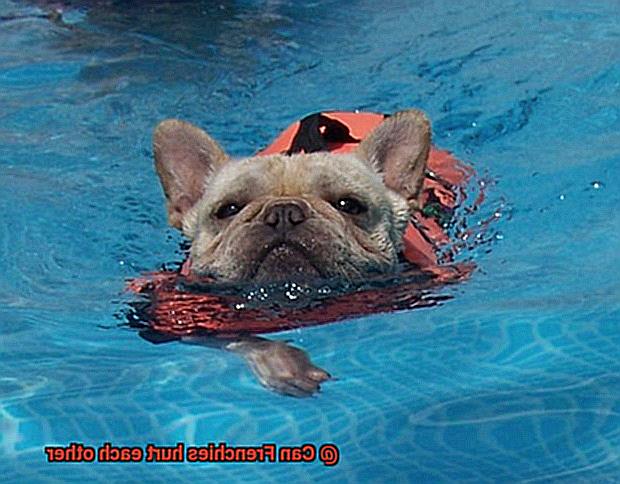Can Frenchies hurt each other?
Ever wondered if these adorable little bundles of joy can accidentally get a bit too rowdy with each other? While French Bulldogs are known for their friendly and affectionate nature, let’s face it – even the best of buddies can have their moments of mischief.
In this blog post, we’re diving headfirst into the question that has been on every Frenchie owner’s mind: Can Frenchies hurt each other? Get ready to uncover the truth as we explore various scenarios where these pint-sized pooches might unintentionally cross some boundaries. So grab your favorite beverage, sit back, and join us on this enlightening journey.
Now, don’t get us wrong – French Bulldogs are generally gentle and sociable creatures. But let’s not forget about their spirited personalities and insatiable curiosity. These traits can sometimes lead to a little too much roughhousing within their furry community. It’s important for Frenchie owners to be aware of common situations where their adorable companions might unintentionally cause harm, like during playtime shenanigans or when protecting their precious resources.
We’re here to arm you with all the knowledge and strategies you need to keep your Frenchies safe and sound. By understanding their temperament, knowing what triggers them, and implementing effective training techniques, we can ensure they enjoy a harmonious environment without any unwanted scuffles.
So whether you’re an experienced Frenchie parent or considering adding one to your family, buckle up as we unravel the truth about Frenchies’ potential for causing chaos. Get ready to debunk some myths and shed light on surprising aspects of their behavior.
Remember – our goal is to create a community where we can come together, share experiences, and learn from one another. Let’s make sure our beloved Frenchies live their best lives in a world built on love, understanding, and safety.
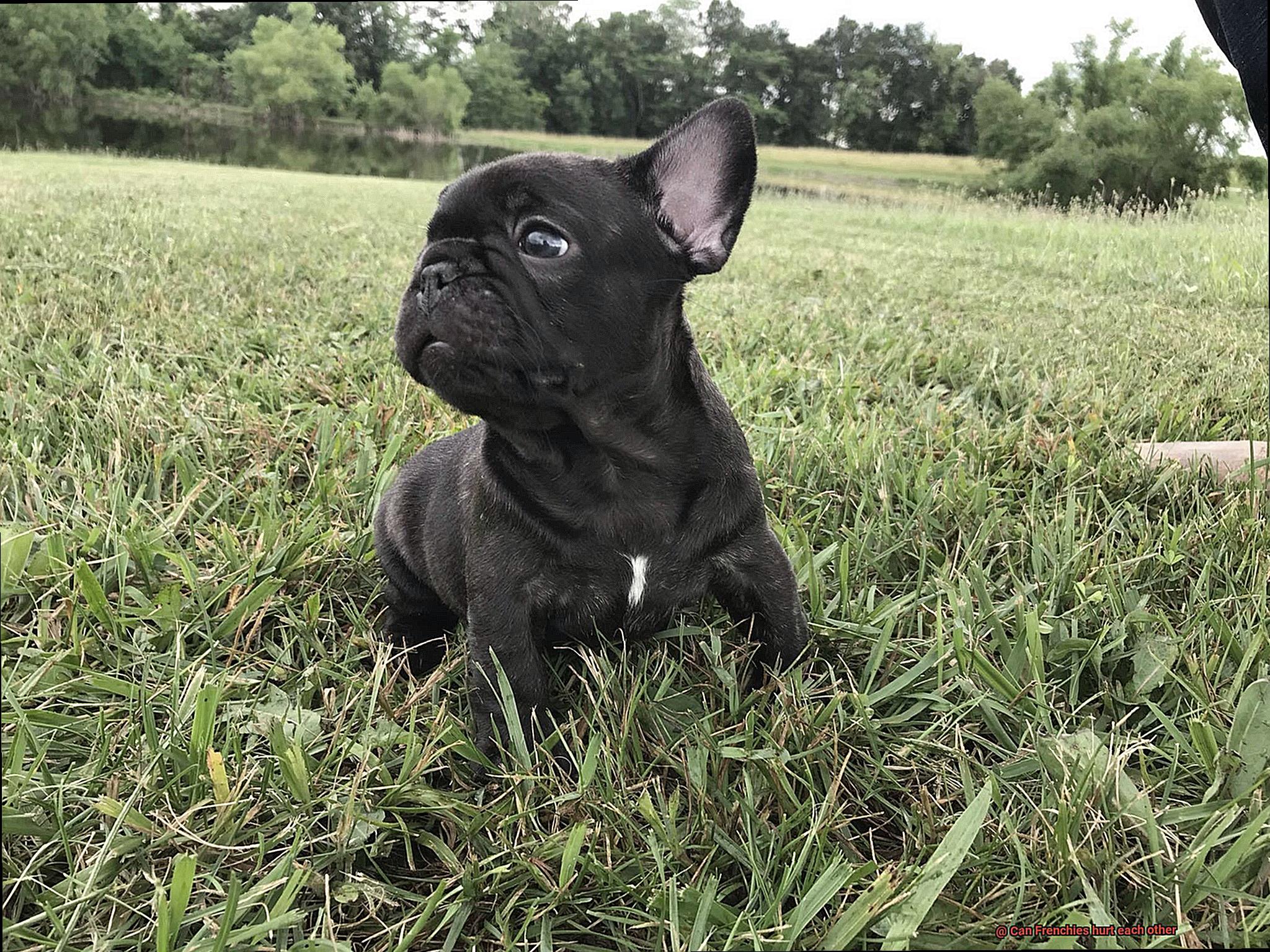
So grab a seat at the virtual French Bulldog cafe and get ready to embark on this eye-opening journey with us. Let’s explore the fascinating world of French Bulldogs’ interactions and put any doubts or concerns to rest for all fellow pet parents out there.
Can Frenchies hurt each other
Contents
- 1 Can Frenchies hurt each other
- 2 What Is Resource Guarding and How Does It Affect Frenchies?
- 3 The Impact of Dominance and Territoriality on French Bulldogs
- 4 The Role of Socialization in Preventing Aggression Between Frenchies
- 4.1 Early Socialization: The Key to Success
- 4.2 Positive Experiences: Building Trust and Reducing Aggression
- 4.3 Supervised Playdates: Learning Appropriate Interactions
- 4.4 Consistency is Key: Maintaining Sociable Nature
- 4.5 Calm and Assertive Leadership: Setting the Tone
- 4.6 Professional Help: Training Classes and Dog Trainers
- 4.7 Ongoing Socialization: Reinforcing Positive Behaviors
- 5 Health Issues That May Contribute to Potential Harm Between Frenchies
- 6 Tips for Training Your Frenchie to Avoid Conflicts with Other Dogs
- 7 Ways to Manage Playful Roughness Between French Bulldogs
- 8 Understanding the Possibility of Unintentional Injury Among French Bulldogs
- 9 Strategies for Dealing With Potential Conflict Situations Involving Frenchies
- 10 Conclusion
French Bulldogs, or Frenchies, are known for their playful and sociable nature. However, like any other breed, they have the potential to hurt each other if certain circumstances arise. In this blog post, we will explore why Frenchies can hurt each other and provide valuable tips for owners on how to prevent such incidents. So, let’s dive in and ensure the safety and well-being of our furry friends.
Supervise Playtime:
French Bulldogs love to play and interact with other dogs. However, during play, things can sometimes get a bit rough. To prevent potential injuries, it is crucial for owners to closely supervise their Frenchies during playtime. This includes:
- Ensuring the play area is safe and free from hazards such as sharp objects or small choking hazards.
- Intervening if play becomes too intense or aggressive by redirecting their attention or temporarily separating the dogs.
Socialization is Key:
Proper socialization from an early age plays a vital role in preventing aggression between French Bulldogs. Expose your Frenchie to various environments, people, and other dogs. This helps them learn appropriate social skills and how to interact without causing harm.
- Organize playdates with well-behaved dogs to provide positive experiences and teach them proper play etiquette.
- Enroll in obedience classes or hire a professional dog trainer to help with socialization and behavior management.
Address Aggression and Resource Guarding:
If you notice any signs of aggression or resource guarding behavior in your French Bulldogs, it is essential to address these issues promptly. Here’s what you can do:
- Seek guidance from a professional dog behaviorist or trainer who specializes in positive reinforcement training techniques.
- Implement reward-based training methods to encourage positive behaviors and discourage aggression or possessiveness.
- Ensure that all dogs have equal access to resources, such as food, water, toys, and attention, to prevent resource guarding conflicts.
Neuter/Spay Your French Bulldogs:
Intact male French Bulldogs may exhibit more aggressive behavior towards other dogs, especially if there are females in heat nearby. Having your Frenchies neutered or spayed can help reduce the likelihood of harmful interactions and promote a harmonious environment.
Pay Attention to Individual Personalities:
Just like humans, dogs have different personalities. Some French Bulldogs may be more prone to aggression or dominance than others. If you have multiple Frenchies in your household, pay attention to their individual personalities and manage any potential conflicts accordingly.
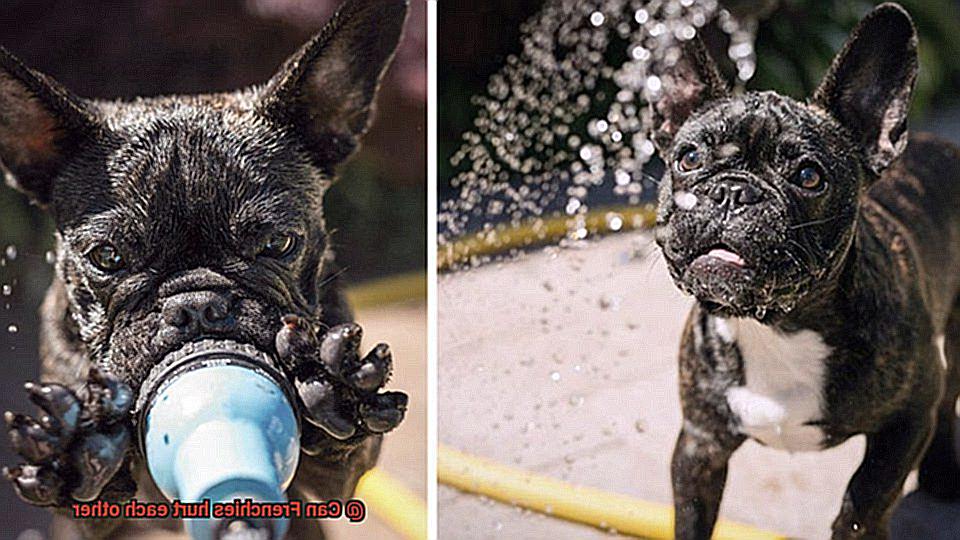
What Is Resource Guarding and How Does It Affect Frenchies?
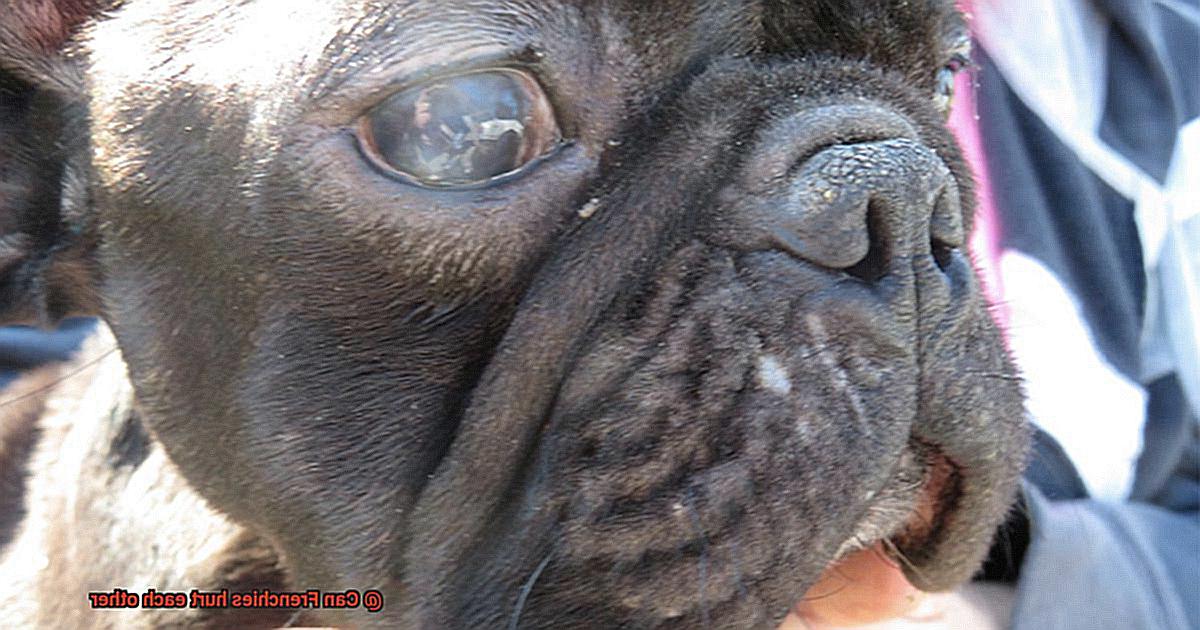
French Bulldogs are known for their playful and affectionate nature. However, like any other dog breed, they can exhibit resource guarding behavior. Resource guarding refers to a dog’s instinctual behavior of protecting valuable resources, such as food, toys, or even sleeping spots, from other animals or humans.
Understanding resource guarding and its impact on French Bulldogs is crucial for dog owners. Let’s explore how resource guarding can affect Frenchies and learn some effective strategies to manage this behavior.
Signs of Resource Guarding in French Bulldogs
Resource guarding can manifest in various ways in French Bulldogs. Some common signs include:
- Growling or snapping when approached near their possessions.
- Showing aggression towards other dogs or humans when they get too close to their resources.
- Becoming tense or anxious when someone tries to take away their belongings.
The Impact on French Bulldogs
Resource guarding can have significant implications for French Bulldogs and their relationships with others. It can lead to conflicts and fights with other dogs, resulting in physical harm. Moreover, resource guarding behaviors can strain the bond between the dog and its owner. It creates possessiveness and territoriality, making Frenchies less tolerant of sharing their space or belongings.
Managing Resource Guarding
Fortunately, there are effective strategies to manage resource guarding behaviors in French Bulldogs:
- Positive Reinforcement Training: Teach your Frenchie that giving up resources voluntarily leads to positive outcomes. Use treats or rewards to reinforce this behavior and gradually increase the difficulty level during training sessions.
- Establish Clear Boundaries: Set clear rules about resource access and teach your Frenchie to respect them. Consistency and structure play a vital role in managing resource guarding behaviors.
- Provide Individual Spaces: French Bulldogs should have designated spaces and possessions that are solely theirs. This helps alleviate potential conflicts with other animals or humans.
- Seek Professional Help: If your Frenchie’s resource guarding behavior is severe or persistent, consider consulting a certified dog trainer or behaviorist. They can provide tailored guidance and develop a behavior modification plan.

The Impact of Dominance and Territoriality on French Bulldogs
French Bulldogs are beloved companions known for their affectionate nature and playful demeanor. However, like any other dog breed, they possess natural instincts and behaviors that can impact their interactions with other dogs, particularly when it comes to dominance and territoriality. In this article, we will explore the impact of these behaviors on French Bulldogs and discuss effective strategies for owners to manage and mitigate any potential conflicts.
The Impact of Dominance on French Bulldogs:
- Definition: Dominance is a normal behavior in dogs and serves as a way to establish social hierarchy within a group.
- Manifestations: Dominance can be expressed through growling, posturing, or resource guarding.
- Potential Risks: While dominance does not necessarily equate to aggression, it can escalate and lead to harmful conflicts between French Bulldogs or other dogs.
- Prevention and Management: Early socialization and positive reinforcement training are essential in minimizing dominant behaviors. Owners should provide clear boundaries, avoid reinforcing dominant behaviors, and seek professional guidance if necessary.
The Influence of Territoriality on French Bulldogs:
- Understanding Territoriality: Dogs have an innate instinct to protect their territory from perceived threats.
- Territory Conflicts: Introducing French Bulldogs to each other’s territories can trigger conflicts as they try to establish dominance or defend their space.
- Minimizing Conflicts: Owners should gradually introduce French Bulldogs in neutral environments, supervise interactions closely, and provide each dog with their own designated space and resources.
Effective Management Strategies:
- Socialization: Expose French Bulldogs to various environments, people, and dogs from an early age to promote positive interactions.
- Training and Positive Reinforcement: Positive reinforcement techniques can redirect dominant or territorial behaviors into more desirable actions.
- Individual Spaces: Each French Bulldog should have their own designated area, bed, and toys to minimize conflicts over resources.
- Monitoring and Intervention: Observe interactions between French Bulldogs and intervene if necessary to prevent any potential harm.
- Professional Guidance: Seeking assistance from a dog trainer or behaviorist can provide expert insights and tailored solutions for managing dominance and territoriality.
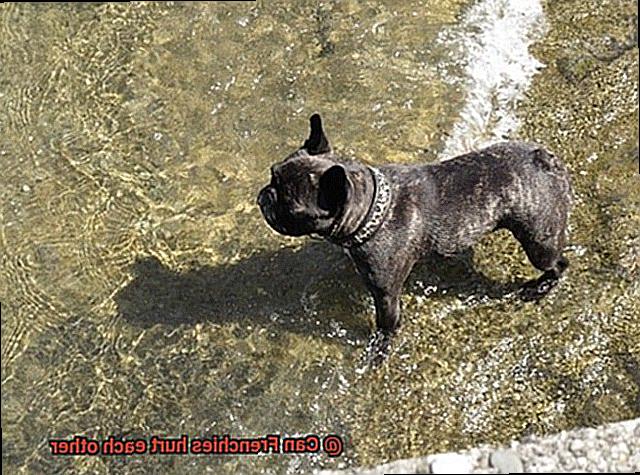
The Role of Socialization in Preventing Aggression Between Frenchies
French Bulldogs are known for their friendly and sociable nature, but without proper socialization, they may exhibit aggressive behavior towards other dogs.
Socialization plays a crucial role in preventing aggression and shaping a Frenchie’s behavior and temperament towards other dogs.
In this section, we will discuss the importance of early socialization, positive experiences, supervised playdates, consistency, and ongoing socialization throughout a Frenchie’s life.
Early Socialization: The Key to Success
Early socialization is key in preventing aggression between Frenchies. It should ideally start during the puppy stage when they are most receptive to learning. Introduce your Frenchie to various environments, people, and animals to help them become comfortable and confident in different situations.
Positive Experiences: Building Trust and Reducing Aggression
Positive experiences during socialization can greatly reduce the likelihood of aggression towards other dogs. Expose your Frenchie to well-behaved and friendly dogs to teach them proper social cues and behaviors. Reward good behavior with treats or praise to reinforce positive associations.
Supervised Playdates: Learning Appropriate Interactions
Properly supervised playdates with other dogs can teach Frenchies how to interact appropriately and recognize boundaries. Ensure that the play environment is safe and that both dogs are comfortable with each other. Be mindful of any signs of aggression or discomfort and intervene if necessary.
Consistency is Key: Maintaining Sociable Nature
Consistency is crucial in socializing Frenchies to prevent aggression. Regular exposure to different environments, people, and dogs helps maintain their sociable nature. Make socialization a part of their routine by taking them to dog parks or on walks where they can interact with other dogs.
Calm and Assertive Leadership: Setting the Tone
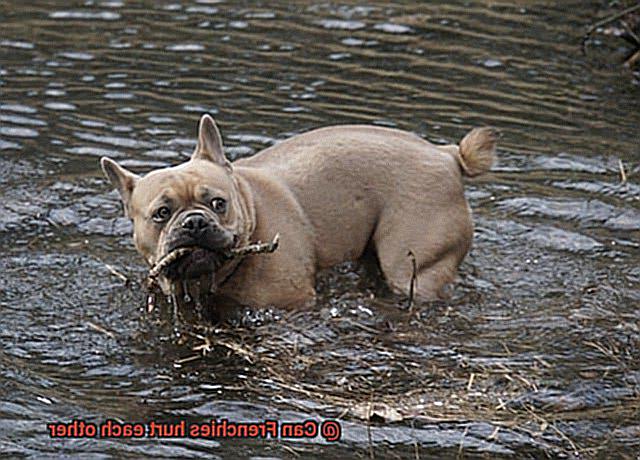
During socialization sessions, it is important for owners to remain calm and assertive. Reacting anxiously or aggressively can negatively impact a Frenchie’s behavior and potentially lead to aggression. Show confidence and provide clear guidance to your Frenchie during social interactions.
Professional Help: Training Classes and Dog Trainers
Consider enrolling your Frenchie in training classes or working with a professional dog trainer to teach them appropriate social skills and behavior towards other dogs. These experts can provide guidance tailored to your Frenchie’s specific needs, helping to prevent aggression and promote positive interactions.
Ongoing Socialization: Reinforcing Positive Behaviors
Socialization should not end once your Frenchie reaches adulthood. Continued exposure to different environments, people, and dogs is important in reinforcing positive behaviors and preventing aggression from developing later on.
Health Issues That May Contribute to Potential Harm Between Frenchies
French Bulldogs are beloved for their adorable appearance and playful personalities. However, they are prone to certain health issues that can potentially contribute to harm between them.
In this section, we will explore some of these health conditions and their impact on interactions between Frenchies.
Brachycephalic Obstructive Airway Syndrome (BOAS):
BOAS is a common issue among dogs with short noses and flat faces, including French Bulldogs. It can cause difficulty in breathing, respiratory distress, and overheating. These discomforts may trigger aggressive behavior or increased irritability, leading to potential harm between Frenchies.
Allergies:
French Bulldogs can develop allergies to various environmental factors, foods, or even other dogs. Allergic reactions can cause discomfort and irritability, which may manifest as aggression towards other Frenchies. Identifying and managing these allergies is crucial in promoting harmonious interactions.
Joint and Bone Problems:
French Bulldogs often experience joint and bone problems, such as hip dysplasia or intervertebral disc disease. These conditions can cause pain and discomfort, making them more likely to react aggressively when their affected areas are touched or bumped into inadvertently by other dogs.

Skin Conditions:
Skin conditions like dermatitis or allergies are prevalent in French Bulldogs. Constant itching and discomfort can lead to heightened irritability and aggression towards other dogs, including fellow Frenchies. Regular grooming and appropriate treatment are essential to alleviate these issues.
Minimizing Potential Harm:

To mitigate potential harm between French Bulldogs, responsible ownership is vital:
- Regular veterinary check-ups: Regular visits help identify and address any underlying health conditions that may contribute to aggression or harm.
- Balanced diet and exercise: Providing a healthy diet and regular exercise helps maintain overall well-being, reducing the likelihood of aggressive behavior.
- Comfortable environment: A stress-free environment promotes calmness among Frenchies and minimizes potential conflicts.
- Proper socialization and training: Early socialization allows French Bulldogs to interact with other dogs in a controlled environment, reducing the chances of aggression caused by fear or anxiety.
Tips for Training Your Frenchie to Avoid Conflicts with Other Dogs
French Bulldogs, or Frenchies, are known for their friendly and playful nature. However, conflicts with other dogs can arise if they are not properly trained and socialized. In this guide, we will explore effective tips to help you train your Frenchie to avoid conflicts with other dogs and promote positive interactions.
Proper socialization is crucial for French Bulldogs to develop good social skills and become comfortable in different situations. Introduce your Frenchie to various environments, people, and dogs from an early age. This exposure will help them learn how to interact appropriately and reduce the likelihood of conflicts in the future.
Positive reinforcement:
Using positive reinforcement techniques, such as treats, praise, and rewards, is essential in training your Frenchie. When they interact calmly and positively with other dogs, reward them to reinforce the behavior. This will create positive associations and encourage them to repeat good behavior in future interactions.
Teach basic obedience commands:
Teaching your Frenchie basic obedience commands like sit, stay, and come can provide you with better control in potentially challenging situations. These commands allow you to redirect their attention if needed and prevent conflicts from escalating.
Use desensitization techniques:
If your Frenchie tends to react negatively or aggressively towards other dogs, desensitization techniques can be helpful. Start by exposing them to other dogs from a distance where they feel comfortable and gradually decrease the distance over time. Pair these exposures with positive experiences and rewards to help your Frenchie associate other dogs with positive outcomes.
Avoid tense or aggressive situations:
As a responsible owner, be aware of your Frenchie’s triggers and avoid tense or aggressive situations whenever possible. If you notice signs of discomfort or aggression in your Frenchie, calmly remove them from the situation and redirect their attention elsewhere. This will help prevent conflicts and keep everyone safe.
Ways to Manage Playful Roughness Between French Bulldogs
French Bulldogs are notorious for their playful and energetic personalities. While their rough play can be entertaining, it’s important for owners to manage this behavior to prevent any harm. In this blog post, we will explore effective ways to ensure the safety and well-being of your Frenchies while still allowing them to enjoy their playful nature.
Supervision
Always keep a close eye on your French Bulldogs during playtime. This allows you to intervene if things get too rough or if one dog becomes overwhelmed. Look out for signs of distress such as flattened ears, growling, or excessive biting. By supervising their interactions, you can step in and redirect their attention or separate them if necessary.
Training and Socialization
Proper training and socialization are essential in managing rough play between French Bulldogs. Teach them basic commands like “gentle” or “enough” to help control their excitement levels and prevent excessive roughness. Additionally, expose your Frenchies to various environments, people, and other dogs from an early age to help them develop good social skills and appropriate play behavior.
Set Boundaries
Establish clear boundaries for your French Bulldogs during playtime. Teach them to respect each other’s personal space and discourage behaviors that escalate the play into aggression. Use positive reinforcement techniques when they display calm and friendly behavior, rewarding them with treats or praise.
Physical Exercise
Ensure that your French Bulldogs get enough physical exercise to burn off their excess energy. Regular walks, play sessions, and interactive toys can help reduce pent-up energy and prevent them from channeling it into rough play with each other.
Mental Stimulation
In addition to physical exercise, provide mental stimulation for your Frenchies through puzzle toys, obedience training sessions, or scent games. Mental stimulation helps keep their minds engaged and reduces the likelihood of them resorting to rough play as an outlet for boredom.
Understanding the Possibility of Unintentional Injury Among French Bulldogs
In this blog post, we will discuss the potential risks that French Bulldogs face and provide practical tips on how to prevent harm to our furry friends.
Rough Play with Other Dogs:
French Bulldogs have a strong desire to socialize with other dogs, but their small size makes them vulnerable during playtime. To prevent injuries, always supervise their interactions with larger or more energetic dogs. If the play becomes too rough, intervene and redirect their attention to a calmer activity. Remember, it’s better to be safe than sorry.
Brachycephalic Anatomy:
French Bulldogs’ short-nosed anatomy can make them prone to respiratory problems and overheating. Avoid strenuous exercise or play in hot weather to prevent heatstroke or breathing difficulties. Provide plenty of fresh water and shade during outdoor activities, and consider using cooling mats or vests to keep them comfortable.
Chasing After Objects:
French Bulldogs have a natural instinct to chase after small animals or objects. While this can be fun, it also poses risks. Remove any potential hazards from their play area, such as sharp objects or unstable furniture. Keep them away from stairs or areas where they could easily fall or collide with obstacles.
Curiosity Can Be Dangerous:
French Bulldogs are curious creatures who love exploring their surroundings. However, this curiosity can lead them into dangerous situations. Keep an eye on them to prevent accidents like getting stuck in tight spaces or ingesting harmful substances. Also, secure any high surfaces to avoid accidental falls.
Safe Environment:
Create a safe environment for your French Bulldog by removing potential hazards from their living space. This includes keeping toxic plants out of reach, securing loose electrical cords, and using baby gates to block off unsafe areas. Remember, prevention is key.
Know Their Limitations:
While French Bulldogs have energy to spare, it’s important to know their limitations. Avoid overexertion or prolonged physical activities that can lead to fatigue and injuries. A tired Frenchie is more prone to accidents, so find a balance between exercise and rest.
Regular Vet Check-ups:
Schedule regular visits to the veterinarian to address any underlying health issues that may increase the risk of unintentional injuries. Your vet can provide guidance on how to keep your French Bulldog safe and healthy.
Strategies for Dealing With Potential Conflict Situations Involving Frenchies
French Bulldogs, or Frenchies, are adorable and affectionate companions, but conflicts can arise between them due to their territorial nature, dominance issues, or resource guarding. It is essential to have strategies in place to prevent and manage potential conflicts involving Frenchies. In this section, we will discuss practical strategies that can help you handle potential conflict situations involving French Bulldogs.
Early Socialization and Training:
Early socialization and training are crucial in preventing conflicts among Frenchies. Expose them to various environments, people, and other dogs from a young age. Enroll them in puppy classes where they can learn appropriate social behaviors. This will help them develop good manners and reduce the likelihood of conflicts later on.
Setting Clear Boundaries and Rules:
Establishing clear boundaries and rules within the household is vital to avoid potential conflicts. Make sure each Frenchie knows their place in the family hierarchy and understands what behaviors are acceptable and what are not. Consistency is key in reinforcing these boundaries.
Providing Individual Space and Resources:
To minimize competition and potential conflicts, it is important to provide each Frenchie with their own space and resources. This includes separate beds, feeding areas, and toys. This way, they don’t feel the need to guard or compete for these resources, reducing the likelihood of conflicts.
Supervision and Intervention:
Supervision plays a crucial role in managing potential conflicts among Frenchies. Keep an eye on their interactions, especially during playtime or when resources are involved. If you notice any signs of tension or escalating behavior, intervene calmly by redirecting their attention or separating them temporarily until they calm down.
Positive Reinforcement Training:
Using positive reinforcement training techniques can help encourage desired behaviors and discourage aggressive or confrontational behaviors in Frenchies. Reward them for good behavior, such as sitting calmly or walking nicely on a leash. This will reinforce positive behaviors and help prevent conflicts.
Distraction Techniques:
In case of potential conflicts, distraction techniques can be effective in diffusing the situation. Redirect their attention to something positive, like a treat or an interactive toy. Engage them in play or training activities to redirect their energy and diffuse any tension.
Mental and Physical Stimulation:
Providing Frenchies with adequate mental and physical stimulation is vital to reduce pent-up energy and potential conflicts. Take them for daily walks, engage them in puzzle games or training sessions, and provide them with toys that keep them mentally stimulated. A tired Frenchie is less likely to engage in conflicts.
Seeking Professional Help:
If conflicts persist or escalate despite your efforts, it may be necessary to seek professional help from a qualified trainer or behaviorist who specializes in dealing with canine aggression or conflict resolution. They can provide tailored strategies and guidance to address the specific issues involving your Frenchies.
EvweYG93oF0″ >
Conclusion
French Bulldogs, like any other breed of dog, have the potential to hurt each other. Despite their small size and adorable appearance, Frenchies can still engage in aggressive behavior that may result in injury. It is important for owners to be aware of this and take necessary precautions to prevent such incidents from occurring.
In a playful setting, French Bulldogs may inadvertently harm each other due to their exuberant nature. Their enthusiasm can lead to accidental collisions or rough play that could result in scratches or bruises. Additionally, Frenchies have a strong prey drive and may display aggressive behavior towards smaller animals or even towards each other if they perceive a threat.
While French Bulldogs are generally known for their friendly and sociable temperament, it is crucial to remember that every dog is an individual with unique personality traits. Some Frenchies may exhibit dominance or territorial aggression, especially when resources such as food or toys are involved. This can potentially escalate into physical altercations between dogs.
To mitigate the risk of Frenchies hurting each other, responsible owners should ensure proper socialization and training from an early age. This includes exposing them to different environments, people, and animals so they become well-adjusted and less likely to react aggressively. Supervision during playtime is also essential to intervene if any signs of aggression arise.
Moreover, providing each Frenchie with their own space and resources can help prevent conflicts over possessions. Feeding them separately and monitoring their interactions during mealtime can reduce the chances of resource guarding behaviors leading to fights.
In conclusion, while French Bulldogs are generally gentle and affectionate companions, they do have the potential to hurt each other through unintentional rough play or displays of aggression.
